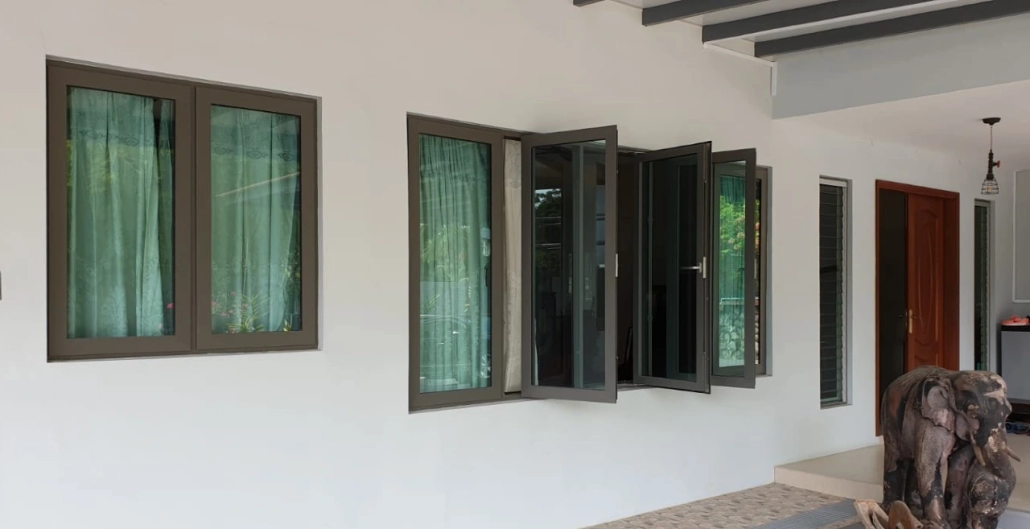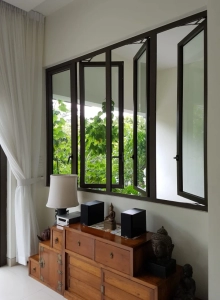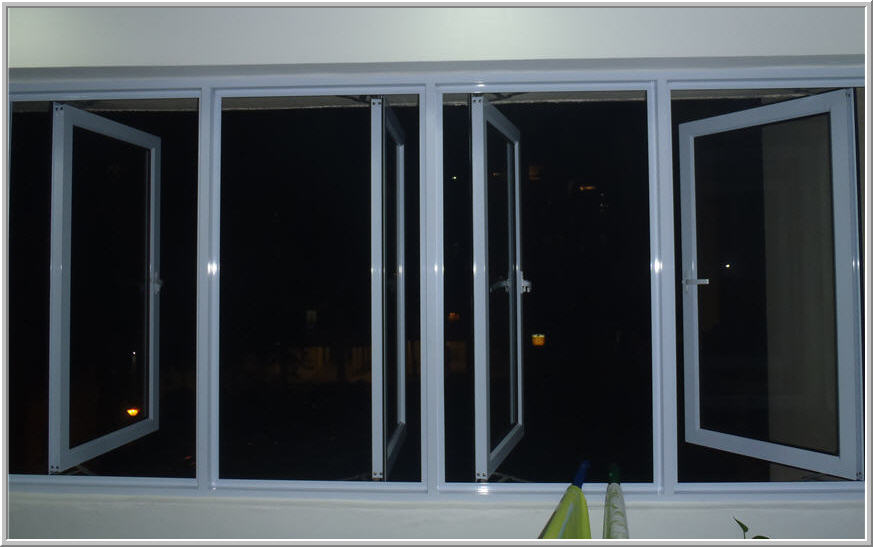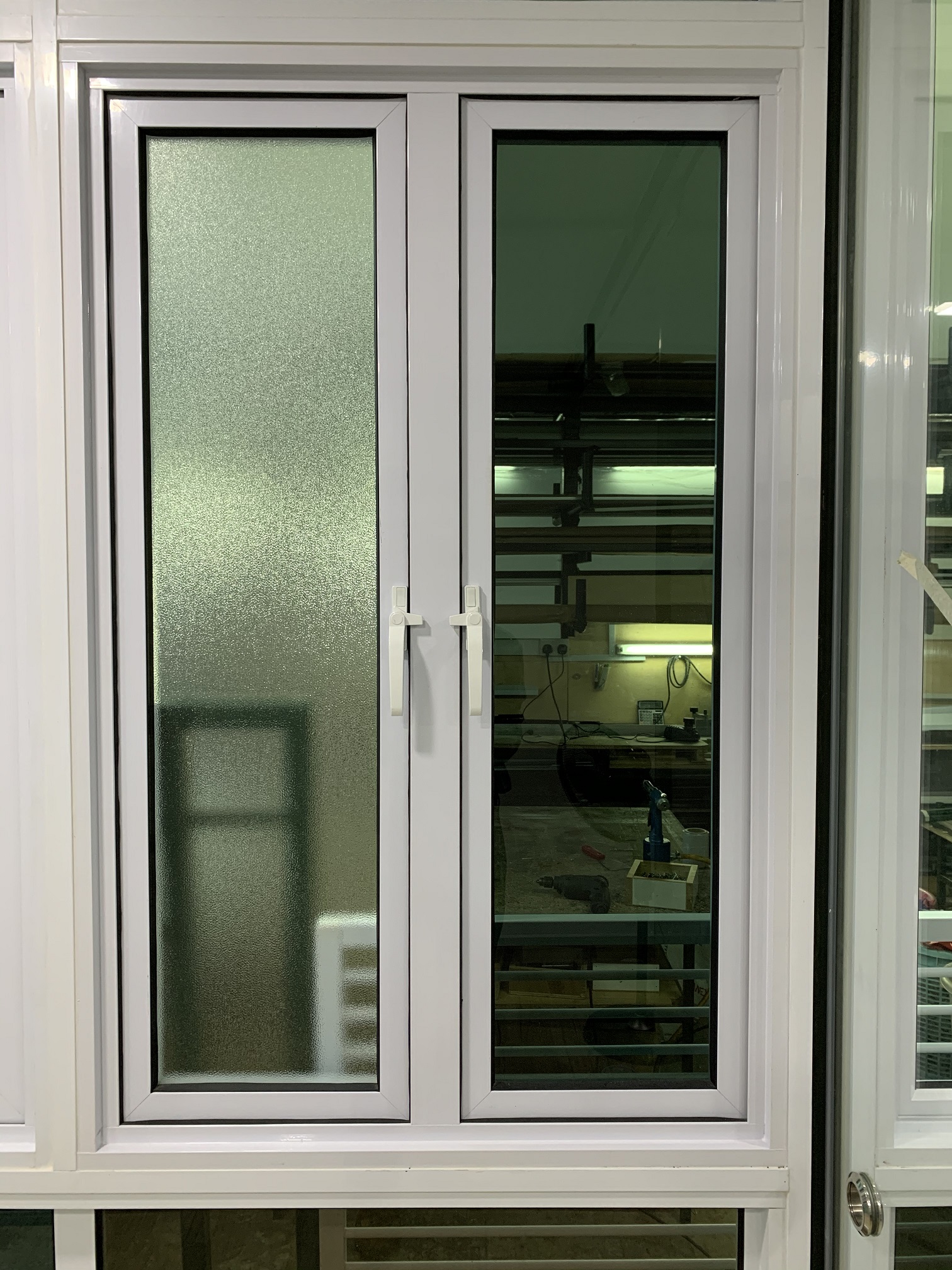Casement Windows in Singapore
Durable, functional, and sleek solutions for HDB, Condominium & Landed Homes

Casement windows remain one of the most popular window types among Singapore homeowners. Favoured for their elegant appearance, practicality, and excellent ventilation, these windows can be found in HDB flats, condominiums, and landed properties across the island. Whether you are planning a new window installation or a window replacement, understanding the benefits, materials, and safety standards for casement windows will help you make the right choice.
What Is a Casement Window?
A casement window is attached to its frame by one or more side hinges. It opens outwards or inwards using a handle or crank mechanism – similar to a door. In Singapore, most casement windows open outwards to maximise indoor space while allowing for optimal air circulation. Depending on their configuration, they can be side-hung or top-hung.
Common types of casement windows:
- Side-hung casement windows: Open sideways and are often used in bedrooms, living rooms, and kitchens.
- Top-hung casement windows: Open from the bottom and are commonly installed in bathrooms, service yards, or corridors for privacy and airflow.
Why Choose Casement Windows for Your Home?
Casement windows are valued for their versatility and timeless design. Here’s why they are a smart investment for Singapore homes:
 Superior Ventilation
Superior Ventilation
Unlike sliding windows, casement windows can be fully opened, allowing maximum airflow. They catch passing breezes effectively ideal for Singapore’s warm, humid climate.
- Better Sound Insulation
When properly installed and sealed, casement windows create an airtight closure that helps block outdoor noise. Homeowners living near busy roads or MRT tracks can opt for double-glazed or soundproof casement windows to achieve even greater noise reduction.
- Enhanced Energy Efficiency
Casement windows close tightly, reducing heat transfer and air leaks. Pairing them with energy-efficient glass, such as low-E or double-glazed glass, can improve indoor comfort and lower air-conditioning costs.
- Strong Security and Safety
Casement windows typically use multi-point locking systems that secure the window at several points along the frame. This design offers stronger protection compared to simple sliding locks.
- Sleek, Customisable Aesthetics
Casement windows come in a variety of frame finishes powder-coated aluminium in white, grey, or black being the most popular choices. You can also choose different glass types (clear, tinted, frosted, or laminated) to match your home design and privacy needs.

Soundproof Casement Windows
Singapore’s urban noise can be a challenge – especially for homes near expressways or MRT tracks. Our noise reducing casement windows support advanced acoustic glazing options for improved soundproofing and safety.
Glass Options:
- Double Glazing (5 mm + 12A + 5 mm): Provides insulation against heat and noise.
- Triple Glazing (5 mm + 12A + 5 mm + 12A + 5mm): Adds an extra layer of protection and thermal control.
- Laminated Glass: Prevents shattering and improves security.
- Heat-Soaked Tempered Glass: Reduces risk of spontaneous breakage due to temperature fluctuations.
- Low-E Glass: Reflects infrared heat while allowing visible light to enter—ideal for energy efficiency.
Acoustic Rating (STC 50):
Some fire-rated and sound-insulated glass panels achieve STC 50, significantly reducing external noise penetration and enhancing comfort indoors—perfect for bedrooms, home offices, or study areas.
.
Common Problems with Casement Windows (and How to Fix Them)
Like all fittings exposed to Singapore’s humid weather, casement windows require periodic inspection and maintenance. The Building and Construction Authority (BCA) and Housing & Development Board (HDB) have set specific safety standards for window upkeep to prevent accidents and ensure durability.
Below are common issues and their recommended solutions based on official guidelines:
| Problem | Recommended Action |
|---|---|
| Rusty, corroded, or broken screws and rivets | Engage a BCA-approved window contractor to replace friction stays and rivets with stainless steel grade 304 or equivalent. Each friction stay should have at least 4 rivets or screws on each side for newly replaced windows. |
| Sagged, bent, or loose friction stay | Replace or refit the friction stay using approved stainless-steel materials. |
| Loose screws or brackets | Tighten or replace all loose components; deteriorated corner brackets must be replaced by a qualified contractor. |
| Loose rubber gaskets | Push rubber gaskets firmly into the groove or replace brittle ones to prevent water seepage. |
| Cracked or loose glass panels | Replace cracked panes immediately. Ensure new glass is securely fitted with a tight gasket seal. |
| Difficulty closing the window | Clean and lubricate friction stays and hinges to remove dirt or debris. Ensure hinges and screws are intact. |
| Wooden casement windows with decayed parts | Replace with aluminium windows for long-term durability; HDB approval is required for such replacements. |
Casement Window Materials and Glass Options
In Singapore, aluminium casement windows are the standard for durability, weather resistance, and ease of maintenance. Here’s what to know about frame and glass options:
Aluminium Frames
- Rust-free and weather-resistant – Ideal for humid tropical climates.
- Powder-coated finishes ensure longevity and colour retention.
- Lightweight yet strong, allowing for large glass panes without sagging.
Glass Options
- Clear Glass: Offers maximum brightness and visibility.
- Tinted Glass: Reduces glare and UV exposure.
- Frosted or Patterned Glass: Provides privacy, perfect for bathrooms or corridors.
- Laminated Glass: Adds an extra layer of safety against breakage.
- Double-Glazed Glass: Improves sound insulation and energy efficiency – especially popular for condominiums near main roads.
Casement Window Replacement and Installation in Singapore
Whether you are upgrading your old windows or installing new ones for a BTO flat or landed home, proper installation by an qualified window contractor is critical for safety purposes. Faulty installation can lead to safety risks, poor insulation, and water leakage during heavy rain.
Steps for Replacement or New Installation:
- Site Assessment: Contractors assess the size, frame condition, and surrounding structure.
- Quotation & Design Selection: Choose frame colour, glass type, and opening configuration.
- Fabrication: Custom-made to your exact window dimensions.
- Installation: Performed by trained technicians using stainless steel fittings and approved friction stays.
- Final Inspection: Ensures the window operates smoothly and complies with HDB/BCA standards.
HDB Casement Window Safety Requirements
HDB mandates that all window replacements in HDB flats be carried out only by BCA-approved window contractors listed under HDB’s directory. Homeowners must also:
- Ensure the use of stainless steel grade 304 rivets/screws.
- Retain the manufacturer’s warranty and installation report.
- Conduct routine inspections—especially for windows installed more than 5 years ago.
Failure to maintain or replace unsafe fittings can result in fines under HDB regulations, as falling windows pose serious public safety risks.
| Type of Casement Window | Est. Price Range (Installed) |
|---|---|
| Side-hung (bedroom/living room) | SGD 280 – 450 per window |
| Top-hung (bathroom/service yard) | SGD 180 – 350 per window |
| Double-glazed soundproof casement | SGD 500 – 800 per window |
| Full set replacement for HDB 4-room flat | From SGD 1,200 – 2,500 (depending on number and size of windows) |
FAQ Section
1. What is the difference between a sliding and a casement window?
Casement windows open outwards on hinges, allowing full ventilation, while sliding windows move horizontally on tracks and occupy less exterior space.
2. How much does it cost to replace casement windows in Singapore?
The average cost ranges from SGD 250 to SGD 800 per window, depending on size, glass type, and soundproofing.
3. Can I replace my HDB casement windows myself?
No. All replacements in HDB flats must be done by BCA-approved contractors to comply with safety laws.
4. How often should I service or inspect my casement windows?
Inspect them at least once a year for loose screws, corrosion, or faulty hinges.
Why Choose a HDB/BCA-Approved Contractor
Engaging a licensed contractor ensures:
- Compliance with local building regulations
- Use of certified stainless steel components
- Proper sealing and waterproofing
- Safe dismantling and disposal of old windows
- Warranty and after-sales support
At Window-Grille-Door.com, we are approved contractors and also handle HDB submission requirements on your behalf, ensuring a smooth and compliant replacement process.





